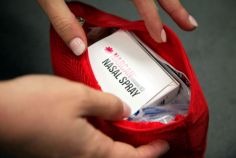Millions of Americans are affected by substance use disorders (SUDs). SUDs are chronic but treatable medical conditions that change the brain and behavior. While it is not an official diagnosis, some SUDs are more commonly called “addictions.” SUDs are complex conditions that make it difficult to control substance use, even when it causes harm.
If you or someone you know is struggling with substance use, you’re not alone. According to a 2023 national survey, 1 in 6 Americans older than age 12 reported experiencing an SUD in the past year. More than 85% of them did not receive substance use treatment during that time.
Below are trusted government resources and tools that can help navigate the path to and through recovery. Whether you're seeking treatment, supporting a loved one, or raising awareness, these resources are here to guide you.
Understanding substance use disorders
Over time, repeated drug use can lead to SUDs. Certain substances have a powerful effect on the brain’s reward system. This may make people with SUDs experience cravings and withdrawal symptoms that can make it difficult to quit using these substances.
Both legal substances (such as alcohol and nicotine) and illegal substances (such as heroin and cocaine) can lead to an SUD if used regularly. Even prescription and over-the-counter medications (such as some painkillers, sleep aids, and cough medicines) can be misused, which may also lead to an SUD.
Learn more with the National Institute on Drug Abuse
- Why are Drugs so Hard to Quit? This video from the National Institute on Drug Abuse (NIDA) breaks down what happens to the brain when someone uses drugs, explains why quitting drugs can be so difficult, and describes how treatment can support recovery.
- Dr. Volkow Explains the Basics of Drugs & Addiction. NIDA Director Nora Volkow, M.D., goes over basic information about substance use and SUDs and describes how NIDA research aims to better understand these topics and improve health.
- What Is Addiction? Scientists from NIDA address common questions that teens have about drug use and addiction in their Virtual Q&A series. This episode covers the brain’s reward system, how it develops, and how addiction science is improving treatment for SUDs.
Recovery is possible
The good news is that SUDs are treatable. Like other chronic conditions, they can be managed effectively. Thanks to ongoing research, there are evidence-based methods to help people with SUDs improve their health and lives. While many people use other terms, this process is often known as being “in recovery” or “in remission.”
Treatment approaches
Several different treatment approaches exist for SUDs, and they each work in different ways. Some treatments help change thoughts and behaviors. Others focus on managing cravings and withdrawal symptoms. Effective SUD treatments address the whole person, often combining multiple approaches tailored to the individual’s needs.
Types of treatment include:
- Medications to ease withdrawal symptoms, reduce cravings, and prevent using substances again
- Behavioral therapy to develop coping skills, address personal challenges, and build skills for managing triggers
- Holistic support to meet a person’s medical, social, work-related, and legal needs
Learn more about treatment options
- Types of Treatment. This resource from the Substance Abuse and Mental Health Services Administration (SAMHSA) has detailed information on different treatment approaches. It covers care settings, harm reduction, and therapy. It also explains how medications can help manage cravings and withdrawal symptoms.
- Medications for Substance Use Disorders. This SAMHSA resource offers information on FDA-approved medications for treating opioid, alcohol, and tobacco use disorders. It explains how these medications work, their benefits, and how they fit into a comprehensive treatment plan.
- Medications for Opioid Use Disorder. This easy-to-understand video from NIDA explains different medications that are commonly used for opioid use disorder (OUD), including how they work and their different forms. It’s also available as an infographic.
Getting help
If you are looking for help related to substance use, these resources are a good place to start.
- SAMHSA’s Treatment Services Locator. This free resource helps individuals locate treatment services across the United States, including for substance use and mental health care. Find local treatment facilities at FindTreatment.gov.
- SAMHSA National Helpline. Call 800-662-4357 (800-662-HELP) or TTY: 1-800-487-4889 for information and treatment referrals for substance use and mental health disorders, prevention, and recovery. It’s free, confidential, and accessible 24 hours a day, 365 days a year.
Help for alcohol use
The National Institute on Alcohol Abuse and Alcoholism has additional resources available to those specifically concerned about drinking. They provide clear information about alcohol use disorder (AUD) and tools to assess your drinking habits.
- Alcohol’s Effects on Health. Learn about how alcohol affects your body and brain, including the risks and health consequences of underage and binge drinking.
- Rethinking Drinking. Understand the risks of drinking, your relationship with alcohol, and how to change your drinking habits.
- Alcohol Treatment Navigator. Find information about AUD, treatment options, and quality care near you.
- Short Takes. Watch brief, informative videos on topics related to alcohol and health. Learn about AUD and options for treating it, how alcohol affects different populations, and more.
If you or someone you know is struggling or in crisis, call or text 988 or chat 988Lifeline.org. No matter where you are in the United States, you can reach a caring, trained counselor who can help.







